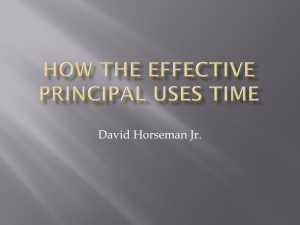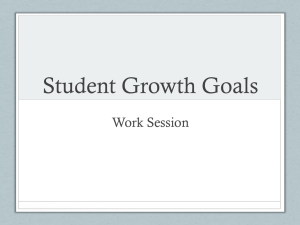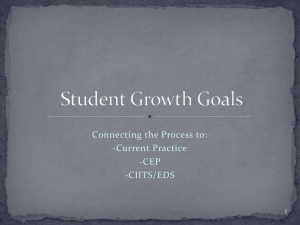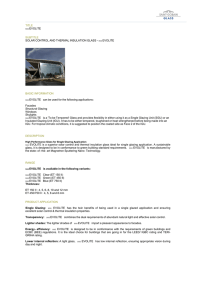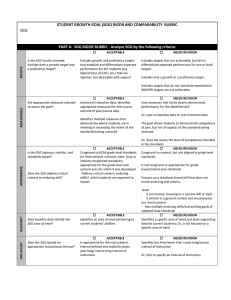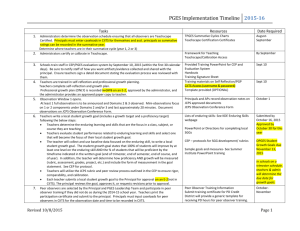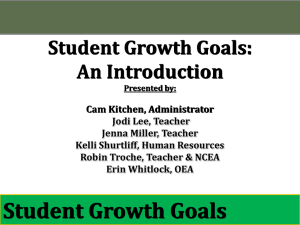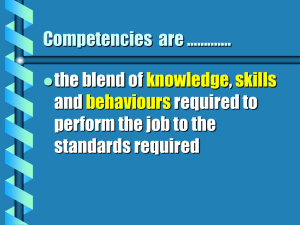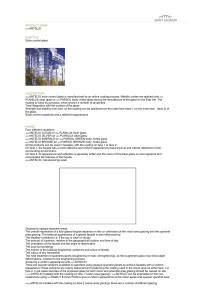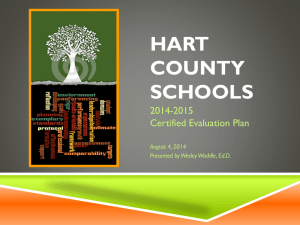PPGES Student Growth Goals
advertisement
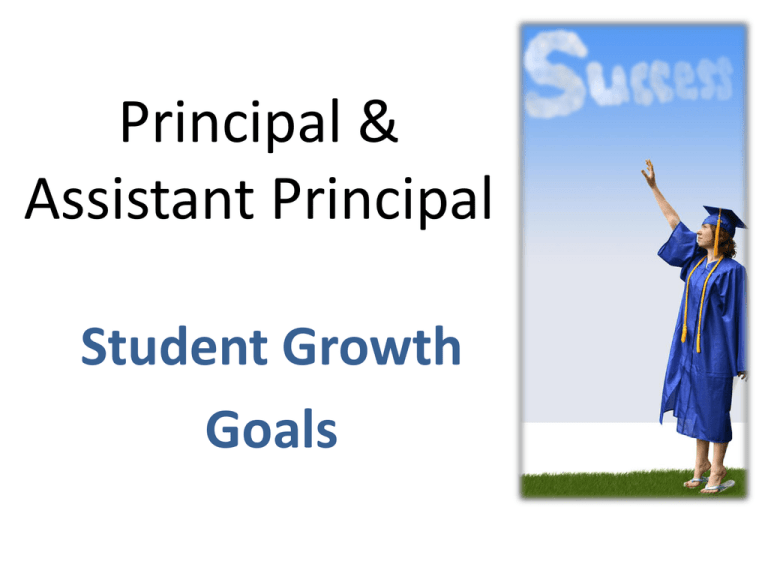
Principal & Assistant Principal Student Growth Goals Your Reaction? Principal and teacher quality account for nearly 60 percent of a school’s total impact on student achievement and principals alone for a full 25 percent. (Marzano et al., 2005). 3 Principal Goal-Setting Process Step 1: Step 2: Step 3: Step 4: Step 5: Determine needs Create specific growth goals based on baseline data Create and implement leadership and management strategies Monitor progress through ongoing data collection Determine goal attainment STUDENT GROWTH GOAL STATE The State Contribution is derived from Growth Goals developed around one of the interim targets housed in ASSIST. LOCAL The Local Contribution is based on school need. Both Goals are inherited by the Assistant Principal At least one goal must be based on Gap Population The local goal may be developed to parallel the State Contribution State Contribution (SGG) Decreasing achievement gaps (E-M-H) Increase average combined reading and math K-PREP scores (E-M-H) Increasing percentage of College and Career Ready students (M-H) Increase average freshman graduation rate(M-H) *State Goal inherited/shared by the assistant principal GOAL • Achievement Gap • K-PREP Combined Reading and Math • College and Career Ready • Freshman Graduation Rate The goal statement, found in the School Report Card, is already set by KBE with a 2017 trajectory. COLLABORATION • Increase or decrease in goal percentage for the current school year • Develop a process and/or rubric to determine goal attainment Determined by the Principal in collaboration with the Superintendent following District CEP guidelines. STRATEGY •Best Practice •Professional Development •Progress Monitoring •Consolidated Planning •Other The strategies are specific to what the PRINCIPAL will do to meet the stated goal and objective. Local Contribution (SGG) • Local Goal – Based on School Need • It may be developed to parallel the State Contribution or it may be developed with a different focus • Based on Gap population unless State goal is based on Gap population. • The Local SGG is inherited/shared by Assistant Principal) Goal Setting Process • Determine Need (Based on Multiple Data Sources) • Create specific growth goals based on baseline data • Create and implement leadership and management strategies • Utilize district decisions to create a rubric to determine goal attainment • Monitor progress through on-going data collection • Determine goal attainment progress through on-going data collection Think It Through • How is the principal’s local SGG similar to the teacher local SGG? How is it different? • What are possible data sources that a principal might utilize in development of the SGG? • How could the assistant principal become an active participant in the SGG process? 10 Two Goals-One Destination • State Goal is the ASSIST Goal with the Trajectory Set KBE. • Local Goal is Based on School Need • One of the two goal must address the gap population • Both Goals are inherited by the assistant principal • The Two Goals May Strongly Parallel LET’S EXAMINE REAL DATA Sample State Goal By September 2015 ABC Elementary will increase the average combined reading and math K-prep scores from 60% to 68% Rating State & Local Goals For each Student Growth Goal the district develops and details the process for determining high, expected, and low growth. This process/rubric is outlined in the District Certified Evaluation Plan (CEP). CEP Examples: State Goal & Rubric Assist goal: By September 2015 ABC Elementary will increase the average combined reading and math K-prep scores from 60% to 68% Low Expected High Below 68% 68% Above 68% Low Expected High Below 65% 65%-68% Above 68% Rating Overall Student Growth Rating Overall Student Growth The District CEP must describe the process and/or instrument to be used to arrive at one student growth rating. Results from the application of district developed rules/rubrics Includes data from both state and local contributions Should include 3 year SGG trend data when available Rating Overall Student Growth Example Student growth ratings must include data from both the local and state contributions. How will our district determine a single rating on student growth? Example: Give both the state and local goal could be given a numerical weighting. – LOW = 1 – EXPECTED = 2 – HIGH = 3 • Determination of a single yearly combined goal rating could be as simple average of the two goals. High Expected High High Expected Expected Expected High Low Local Goal Rating Another Example (combining local and state) Low Expected Expected Low Expected High State Goal Rating Student Growth Trend Data Whenever available three years of trend data should be considered in rating the principal’s SGG. Example: In the following chart total rankings is and average from the previous three years and applied to the following scale. RANKING AVERAGE SCORE Low 1.0 – 1.49 Expected 1.50-2.49 High 2.50-3 Professional Growth Plan Cycle Process Review • • • • • • • Write LOCAL and State Goal goal in fall Develop the Plan Develop a performance rubric Implement the plan Engage in On-Going Reflection Conduct a Mid-Year Review Make modifications to strategies as needed Determining Goal Attainment • LOCAL GOAL-End of School Year • STATE GOAL-September of the following year The State Goal will always be lagged one year 2014/15 • Principals develop a Local and State Growth Goal at the beginning of the year. • The principal receives feedback during the year to help ensure he/she is progressing toward meeting the goal. • The local SGG process/rubric will be used to determine H, E or L on local goal to give student growth rating for determining an overall rating. • Principals will use local student growth data at the end- ofthe-year (1st year: no state goal data) • The following year, principals will have two points: local and lagged state data. Developing the Plan Group Gallery Walk Each individual will add one leadership or management strategy to each goal statement that might be included in the SGG Plan. Looking at goals through the lens of: • Initial Goal Setting • Mid-Year Review • Final Review/Summative Rating Collaboration between Superintendent (Designee) and Principal to set SGGs • Beginning of year/Before October 30 • Discussion/conference to develop/approve goal • Goal should be developed after a thorough review of and reflection on data (TELL, Val-Ed, academic data, nonacademic data, etc) • Superintendent should consider past evaluations, CSIP, School Report Card, school/district initiatives and their impact on the principal and his/her school • Focused on growth and development Questions to ask when setting/approving SGG • What sources of evidence support the need for this goal? • Does the goal support growth and development? Not only of principal, but teachers and students as well? • What sources of evidence will formatively measure progress toward this goal? • Does this goal reflect needs noted elsewhere (CSIP, ASSIST, Program Reviews, etc.) If not, why? If yes, is the goal aligned with/congruent to those other goals/plans? • What will High, Expected, or Low growth look like? Rubric defined in CEP? Ensure agreement and common understanding on how rating will be determined. Collaboration between Superintendent (Designee) and Principal to review progress • Mid Year Review/Before January 30 • To review and reflect on evidence and progress on both the Student Growth plan and the Professional Growth plan. • The goal is to provide systematic feedback. • Adjustments can be made to activities and strategies to tighten focus on goal—the goal itself cannot be changed • The superintendent will complete the Principal Mid-Year Performance Review to indicate if a principal has shown evidence of each of the performance standards. • Plans for the next observation/site visit should be scheduled • Focused on growth and development Questions to ask during mid year review related to goal • What is the current progress toward meeting the goal? • What evidence/documentation does the principal have toward meeting the goal? • What strategies/activities are supporting the goal? • What strategies/activities need to be revisited to support the goal? • What professional growth activities has the principal engaged in to help meet the goal? • What professional growth activities are still needed? Collaboration between Superintendent (Designee) and Principal to review progress, establish summative rating, and set/continue goals • September (after data becomes available) • Documentation/Evidence from principal supporting growth (student and professional) • Summative Rating (based on district rubrics and processes defined in CEP) • Goal setting for the next year • Focused on growth and development Questions for principal and superintendent to consider during final review • How has your leadership resulted in a high level of student academic growth with the population identified in your SGG? With all populations of learners? • How is your SGG (s) aligned to other school goals set this year and how are they directly associated with student achievement? • How have you organized interventions that are designed and implemented to support student learning? • What type of midcourse corrective actions did you take to accomplish desired student academic outcomes? • How do you empower teachers to be truly engaged in improving student success? • Have you adequately met your SGG or does it need to be revised/continued to ensure adequate growth? All evidence and discussion around evidence needs to be aligned to Standards • Consistency (common, understood definitions) • Coherence to district leadership policies and practices • Focused on growth and development of principal Without continual growth and progress, such words as improvement, achievement, and success have no meaning. 34
